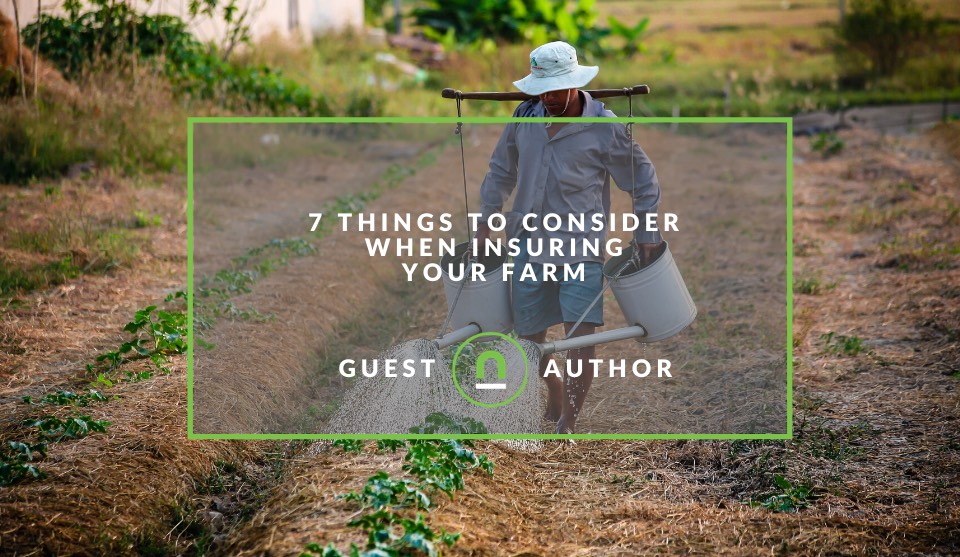Recent posts

Money Talks
XRP vs. Stablecoins: Which Is Better for Cross-Border Payments in 2026?
28 January 2026

Press Releases
Sleep Expert Cautioning Against TikTok’s ‘Mouth Taping’ Trend
28 January 2026

Press Releases
Why Vintage Watches Are the Hottest Trend in 2026
27 January 2026

Press Releases
Africaworks Accelerates The Rollout Of Real Estate Investment Platform
20 January 2026
Popular posts
Extravaganza
Trending Music Hashtags To Get Your Posts Noticed
24 August 2018
Geek Chic
How To Fix iPhone/iPad Only Charging In Certain Positions
05 July 2020
Extravaganza
Trending Wedding Hashtags To Get Your Posts Noticed
18 September 2018
Money Talks
How To Find Coupons & Vouchers Online In South Africa
28 March 2019
7 Things To Consider When Insuring Your Farm
21 November 2019 | 0 comments | Posted by Tibor Anicic in Alarming
When you love what you do, it makes sense that you would want to protect it. Whether you’re farming as a hobby or generating income, it’s essential to ensure that the proper measures are in place to minimize loss, ensure safety and protect you from liability. As a farmer, insuring, your farm is an essential step to protect your property and your livelihood.
That said, as no two farms are the same, it’s crucial to opt for a policy that caters to your farm’s purpose and needs. To help you determine what is right for you and your property, here are seven things to consider when insuring your farm.
1. There is no standard farm insurance coverage
There is a common misconception that farm insurance belongs to the bundle of pre-determined coverages. However, this is not the case. The two primary forms of coverage include dwelling protection and farm liability. The first protects your property in the event of issues such as weather disasters and theft. The second form protects you from losing your farm as a result of a liability claim such as injury to another person and damages to the property.
While these are the primary forms of coverage, you can also choose to tailor your farm insurance policy to suit your needs. Depending upon what you need, you can opt for additional protection to cover things like your barn, crops, and equipment, as well as any commercial vehicles, which would include auto-accidents on the property. It is imperative not to assume any or all of the inclusions you need are included in your policy.
You must ask questions and thoroughly review what you’re getting so you don’t get a nasty surprise should the worst happen.
2. Your livestock require special coverage
You may require exclusive coverage for your livestock, but this will depend on the types of animals that are on your farm. For instance, if you have specific animals that you deem ‘high-value’, then you may want to opt for a scheduled individual coverage. This form of coverage will allow you to cover up to a specific dollar amount, to ensure that you are protected if anything were to happen to your animals.
Otherwise, you can decide to choose a blanket coverage, meaning that all your farm’s property, including livestock, is insured with one lump-sum amount.
3. A standard homeowners policy can cover some farming activities
If you are tending to your farm as a hobby rather than using it to generate income, it’s possible that your standard homeowners’ policy can cover some of your farming duties. Though you should consider that often, homeowners’ policies may exclude things like farm equipment and outbuildings, so it’s essential to understand what is specifically covered.
But this is not necessarily the case for all insurance providers. For instance, Goodville Mutual can combine your farming policy with your home coverage to ensure that you receive the proper protection for your farm-specific needs.
4. Is your farm a hobby farm?
For your farm to be considered a hobby farm, there are a few guidelines that your property must adhere to have it classified accordingly. The criteria for a hobby farm deem that the coverage is limited to a single farming location, the property is less than 500 acres, there are no employees and that the total farm earnings are limited to a maximum of $10,000 (R150 000) per annum.
If you are using your hobby farm to make a profit, then you require different coverage to your basic homeowner’s policy. Once you begin selling farming goods, including in a small capacity, like at the local markets, you should consider a hobby farm policy.
5. The cost will differ
As mentioned previously, no two farms are alike. With the added coverage to suit your specific needs, it makes sense that your desired policy would differ from the next person. As a result, it’s highly likely that you won’t be able to find a set rate from an insurance provider. As such, once you know what you need to be covered, it’s worth shopping around to find a quote that’s right for you.
Additionally, when seeking a quote for farm insurance, you should have the following information handy:
- The size and location of your property
- What you are currently earning Inventory
- A list of your farm structures
- The size of your home
- The location of your property
6. You may need a farm owner’s policy
If farming is less of a hobby and more of a career, then you will require the farm owner’s insurance coverage. This farm owner’s policy will help ensure that your livelihood is protected. This type of policy generally includes property coverage, liability coverage, motor coverage, among other things.
If you need a further guarantee that your property and assets are protected your basic coverage can be adjusted with endorsements that are tailored to your farm’s specific needs.
7. Your coverage may need to change
As life on the farm can be quite dynamic, it makes sense that your coverage will most likely need to change with time. For instance, if you’re looking to expand the scope of your farming operations, you will need to adjust your policy to ensure you are protected.
Ultimately, it’s a great idea to discuss any changes or proposed adjustments to your farm to give you peace of mind that everything is protected should something happen.
So, when it comes to insuring your farm, the golden rule is to remember that in this industry, there is no one size fits all. Placing importance on finding an insurance company which understands your unique situation should be your number one priority to give you peace of mind that you’ll be well looked-after a disaster strike.
Tell us your story
Would you like to write for nichemarket just like Tibor has? Find out how to submit a guest post and when you're ready, you can contact us.
Are you looking to promote your business?
South African finance businesses or safety & security businesses can create your free business listing on nichemarket. The more information you provide about your business, the easier it will be for your customers to find you online.
Registering with nichemarket is easy; all you will need to do is head over to our sign up form and follow the instructions. If you require a more detailed guide on how to create your profile or your listing, then we highly recommend you check out the following articles.
Recommended reading
If you enjoyed this post and have time to spare why not check out these related posts and dive deeper down the rabbit hole that is safety and security.
You might also like
Common ASO Mistakes African App Developers Make
09 January 2026
Posted by Daniel Davis in Industry Experts
ASO is Localisation, Not Translation: Failing to research specific local search terms and cultural nuances is the biggest ASO error in African market...
Read moreSleep Expert Cautioning Against TikTok’s ‘Mouth Taping’ Trend
28 January 2026
Posted by Steph M in Press Releases
Sleep expert warns that the viral mouth taping trend flooding TikTok could pose serious risks for people with undiagnosed sleep apnea and other sleep...
Read more{{comment.sUserName}}
{{comment.iDayLastEdit}} day ago
{{comment.iDayLastEdit}} days ago
 {{blogcategory.sCategoryName}}
{{blogcategory.sCategoryName}}

